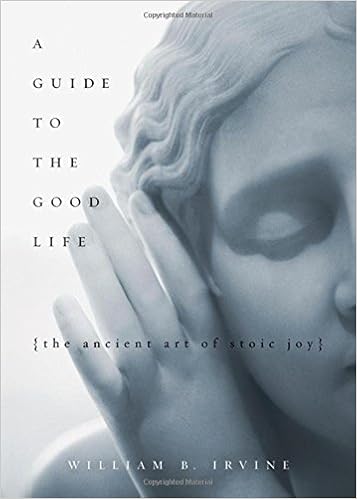A Guide To The Good Life by William Irvine

Over the last year I have been reading a lot of Stoic philosophy. I decided to approached the source texts of Marcus Aurelius and Seneca The Younger first. I had been doing well for myself by reading these very influential texts (most notably Meditations by Marcus Aurelius and On The Shortness of Life by Seneca); however, found myself desiring some interpretation from a modern perspective to help challenge my understanding of this philosophy of life. William Irvine’s A Guide to The Good Life showed up in a lot of searches and was discussed by Derek Sivers in his book notes. Irvine starts by giving a background of why having a philosophy of life is critical, and starts to explain why a religion might not fill that role. He then gives some historical background on Stoicism: first in Greece, and then in Rome where the version of Stoicism that has been best preserved was formed. Irvine then launches forward into various pieces of stoic advice and proceeds to insert his own little quips and opinions in there. Some of the most profound extractions from the stoic texts were:
The practice of negative visualization where you think about the bad things that can happen to you, to prepare for them and prepare yourself for their eventuality. The idea is by doing this you will cherish those things you appreciate more knowing you will not have them forever.
The dichotomy of control which is the idea that you must focus only on the things over which you have agency. The world will throw absurd, and unpredictable things at you, but worrying about those things is pointless. As a result goals should be set internal to yourself. For example, “I do my best at climbing this route” rather than “I will climb this route flawlessly without falling”.
Removing pleasures from your life occasionally can prevent you from depending on them and requiring them to live.
Set your values properly to live a good life. Fame and fortune are not good values.
“People are not disturbed by things, but by the view they take of them” - Epictetus
There are countless others, but those were some of the points which were most relevant to me right now in my life. In general, I would recommend this book, but I think the source texts are actually just as easy to approach and a little less preachy. If you want to be introduced to stoicism I recommend Seneca’s essay On the Shortness of Life, if you find value there then this book might help you understand a biased reconstruction of Stoic thought, which you will be better armed to parse through. Take what you will from the book, but don’t take it as gospel.